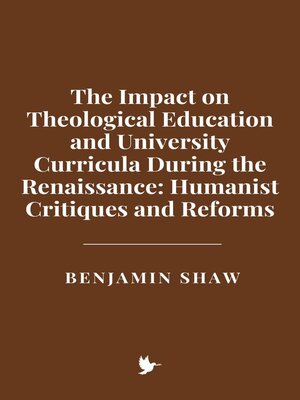The Impact on Theological Education and University Curricula During the Renaissance
ebook ∣ Humanist Critiques and Reforms
By Benjamin Shaw

Sign up to save your library
With an OverDrive account, you can save your favorite libraries for at-a-glance information about availability. Find out more about OverDrive accounts.
Find this title in Libby, the library reading app by OverDrive.



Search for a digital library with this title
Title found at these libraries:
| Library Name | Distance |
|---|---|
| Loading... |
This illuminating study explores how Renaissance humanism profoundly transformed theological education and university curricula across Europe. Benjamin Shaw traces the sweeping intellectual shifts sparked by humanist scholars who challenged medieval scholasticism's dominance—questioning its reliance on abstract disputations, outdated commentaries, and limited engagement with original biblical and patristic sources. By championing a return ad fontes ("to the sources"), humanists revitalized the study of Scripture and the Church Fathers in their original languages, pioneering new methods of textual criticism, historical contextualization, and rhetorical education.
Through detailed case studies of major universities—including Paris, Louvain, Padua, Heidelberg, and Wittenberg—this book reveals how humanist critiques sparked curricular reforms, pedagogical innovations, and vibrant debates between traditional scholastic theologians and reform-minded humanists. Shaw examines the pivotal role of figures such as Lorenzo Valla and Erasmus of Rotterdam in reshaping theological texts and teaching, alongside the Catholic Counter-Reformation's strategic responses embodied in Jesuit education.
Blending rich historical analysis with theological insight, this work offers an indispensable resource for understanding the Renaissance's enduring legacy in modern theological education. It uncovers how humanist scholarship laid the foundation for critical biblical studies, doctrinal renewal, and the dynamic interplay between tradition and innovation that continues to shape theological inquiry today.







